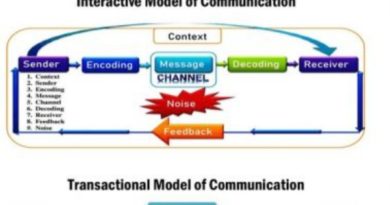What You Can Do When You’re Being Ignored
Friendships can be fickle. One minute they’re good, and the next it feels like you barely even know the other person.
But what do you do when you suddenly realize your friend is totally ignoring your texts, calls and invitations to hang out? Knowing the correct response can ensure you stand up for yourself without overstepping any boundaries.
Before getting any further along, let’s start with I’ve learned over 50 years: Friendships are cyclical. While you may wish friendships were always on a “high,” the reality is, I am realizing this, there are peaks and valleys.
In the world of financial business, there’s something known as the Elliot Wave Principle. It asserts crowd behavior ebbs and flows in noticeable trends.
Relationships are similar. There will be times when things are great and other periods where issues will arise. If you feel like you’re being ignored, then chances are, you’re in one of these valleys.
What you need to figure out is why you’re being ignored and how to respond. This exercise starts with recognizing how you’re being shunned.
- The slow play. A classic sign of being ignored is the slow play. This is when you send a text message, call your friend or invite them somewhere, and they take an abnormally long time to respond. If you’re truly being ignored, you’ll get slow played multiple times over a short period.
- The fake response. Sometimes you’ll talk to your friend and you’ll notice they’re giving vague answers and not making contact. This is often coupled with a desire to quickly leave or change environments. When you’re being ignored via fake responses, there’s typically an underlying cause that’s rooted in hurt or angst.
- The total shun. Finally, there’s the total shun. This is when you reach out to someone multiple times and they never get back to you. I’m finding in the dating world, this is called ghosting.
Now, it’s important to note there are certain situations in which being ignored is nothing purposeful or malicious. I realize people get busy and don’t always realize they’re blocking people out.
For example, let’s say your friend just got a new job in a new city or had a baby. Whereas they used to live twenty minutes away and had a predictable schedule that left them with a lot of free time on nights and weekends, they’re now in a new city with fresh challenges and obligations.
Just because they don’t spend an hour on the phone with you at night doesn’t mean they don’t care for you. It could simply be a byproduct of a demanding schedule that requires more time and energy.
Generally, you can tell the difference between when you’re being ignored on purpose and when it’s merely the result of situational factors. Make sure you’re taking everything into account before jumping to conclusions.
If you feel like you’re being ignored – whether purposefully or unintentionally – it’s important you take action and get to the root cause. Here are four ways to respond.
- PROTECT YOURSELF.
When someone ignores you, they are not meeting your needs, I like to say and you may agree.
While it’s easy to spend your time thinking what you could have done differently, it’s important you protect yourself. I don’t set unrealistic expectations and I prepare for the worst.
Ideally, you’ll be able to have a conversation with your friend and settle everything, but don’t assume everything will be great. Set up some guards and protect yourself. People change and you don’t deserve to be taken on an emotional roller coaster for weeks, months or years.
- MEET FACE TO FACE.
While smartphones and social media are great, the one downside to these tools is speaking face to face has become a bit of a lost art. When we have an issue, we’re more likely to send a text or pick up the phone.
The problem with this response is so much of communication is dependent on non-verbal cues – such as facial expressions, body language and hand motions.
If you can, try to get together with your friend for a conversation about the issue. This will allow you both to communicate with each other without any sort of divide. This also makes it more likely you’ll settle the problem and agree on a solution.
- . AVOID OVERREACTING.
It’s easy to automatically assume someone is ignoring you because they hate you or have replaced you. This most likely isn’t true and you need to avoid overreacting.
There are two distinct types of overreactions – external and internal – and both are unhealthy and unproductive. My counselor and friend Richard Wolfe explains it, “External overreactions are visible responses that others can see (for example, lashing out in anger, throwing your hands up and walking away from a situation). Internal overreactions are emotional responses that remain inside of you that others may or may not be aware of.”
How do you avoid overreacting both externally and internally? One key is I breathe. Take a deep breath before responding to anything (whether in-person or via text).
Deep breathing forces me to put things in perspective and prevents emotional responses that I’ll later regret. Remember that things are never as good or as bad as they seem.
- HAVE ANOTHER FRIEND INTERVENE.
If all else fails, then you may want to get a friend to intervene. But proceed with extreme caution when doing so. If you pick someone who only knows your friend, this could cause more harm than good.
If and only if the person truly knows you and the other person, should you ask them to step in. I’d like to think, playing the messenger and tell them how bad you feel about being ignored by them can be helpful.
A friend can only intervene so much before some sort of positive action has to be taken. At some point, this “messenger” has to stop doing your work for you and needs to bring you both together for some reconciliation.
At the end of the day, you deserve better than to be ignored. If you’ve exhausted all your options and discussed the issue with your friend and had no progress, there comes a time when you just need to move on.
Be respectful, don’t burn any bridges and go your own direction. If your “friend” is a true friend, they’ll eventually own up to their mistakes and come back. Then, you can have an honest conversation about ways to repair the relationship.





